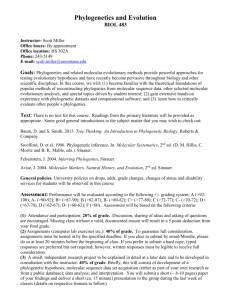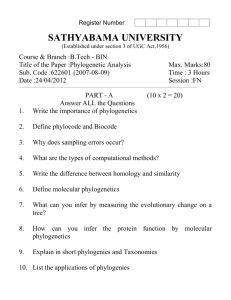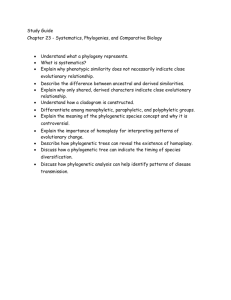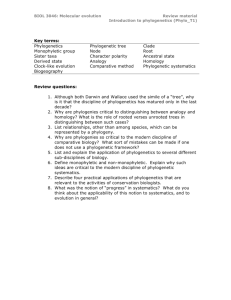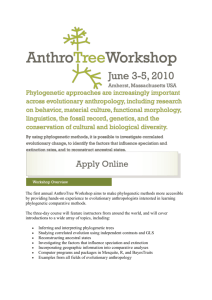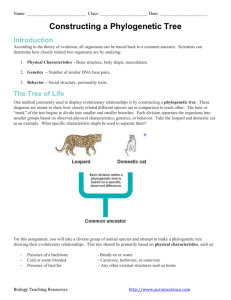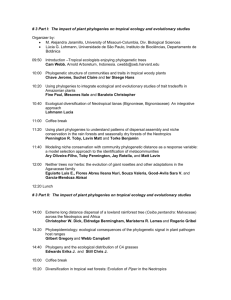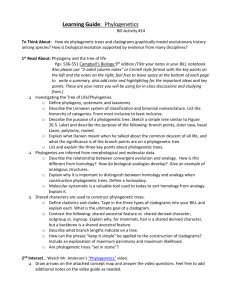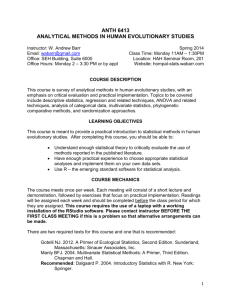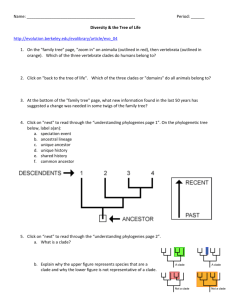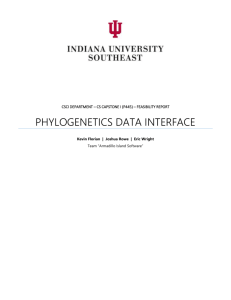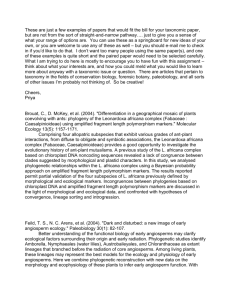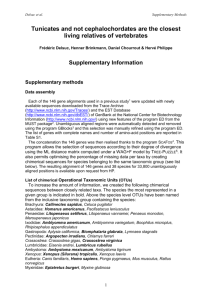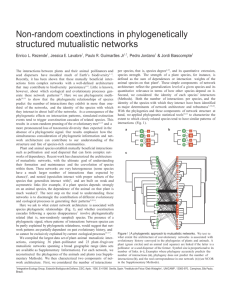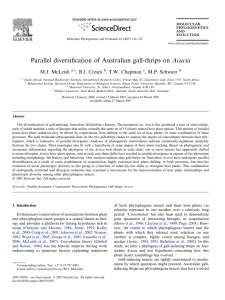Biol254_Syllabus_draft_Final
advertisement
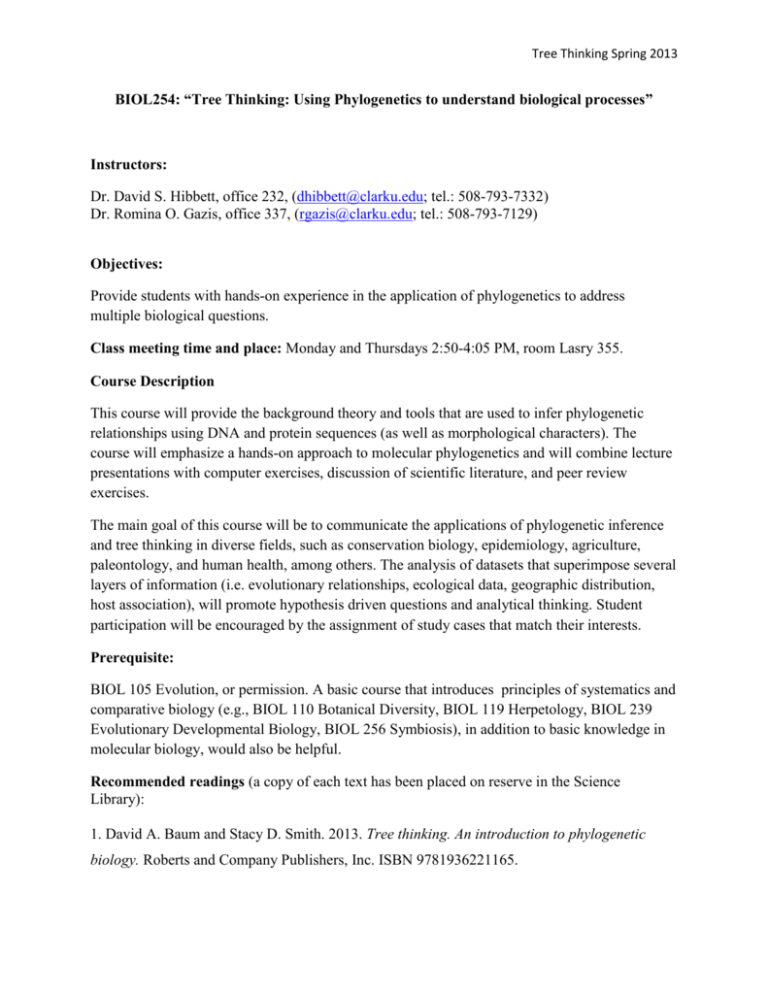
Tree Thinking Spring 2013 BIOL254: “Tree Thinking: Using Phylogenetics to understand biological processes” Instructors: Dr. David S. Hibbett, office 232, (dhibbett@clarku.edu; tel.: 508-793-7332) Dr. Romina O. Gazis, office 337, (rgazis@clarku.edu; tel.: 508-793-7129) Objectives: Provide students with hands-on experience in the application of phylogenetics to address multiple biological questions. Class meeting time and place: Monday and Thursdays 2:50-4:05 PM, room Lasry 355. Course Description This course will provide the background theory and tools that are used to infer phylogenetic relationships using DNA and protein sequences (as well as morphological characters). The course will emphasize a hands-on approach to molecular phylogenetics and will combine lecture presentations with computer exercises, discussion of scientific literature, and peer review exercises. The main goal of this course will be to communicate the applications of phylogenetic inference and tree thinking in diverse fields, such as conservation biology, epidemiology, agriculture, paleontology, and human health, among others. The analysis of datasets that superimpose several layers of information (i.e. evolutionary relationships, ecological data, geographic distribution, host association), will promote hypothesis driven questions and analytical thinking. Student participation will be encouraged by the assignment of study cases that match their interests. Prerequisite: BIOL 105 Evolution, or permission. A basic course that introduces principles of systematics and comparative biology (e.g., BIOL 110 Botanical Diversity, BIOL 119 Herpetology, BIOL 239 Evolutionary Developmental Biology, BIOL 256 Symbiosis), in addition to basic knowledge in molecular biology, would also be helpful. Recommended readings (a copy of each text has been placed on reserve in the Science Library): 1. David A. Baum and Stacy D. Smith. 2013. Tree thinking. An introduction to phylogenetic biology. Roberts and Company Publishers, Inc. ISBN 9781936221165. Tree Thinking Spring 2013 2. Philippe Lemey, Marco Salemi and Anne-Mieke Vandamme (Eds.). 2009. The Phylogenetic Handbook: A Practical Approach to Phylogenetic Analysis and Hypothesis Testing. Cambridge University Press. ISBN 9780521877107. 3. Barry G. Hall. 2011. Phylogenetic Trees Made Easy: A How To Manual. Fourth Edition. Sinauer Associates, Inc. ISBN-10: 0878936068. Grading Grades will be based on: - Homework assignments…………... …………………………………………………..20% Class participation……………………………………………………………………..20% Project Proposal…………………...………………………………………………...…20% Final Project……………………………………………………………………………40% Proposed Schedule (*subject to change) Wk.1 – Jan 14, 17 Wk.2 – Jan 24 (1/21 = MLK day; no classes) Wk.3 – Jan 28, 31 Wk.4 – Feb 04, 07 Wk.5 – Feb 11/14 Wk.6 – Feb 18, 21 Introduction to the course. History of Tree-thinking. Open Tree of Life Project. Understanding what phylogenetic trees are. Reading Phylogenetic Trees. An overview of example applications. [Participants should select topic for their Class Project]. Building Trees: Finding, retrieving, and assembling datasets. Assembling datasets: characters and homology, sequence alignments. [Participants should retrieve one dataset to use for future home assignments and to practice the software learn during class] Inferring Phylogenies – Tree Building: Distance methods vs. model based methods. Models of Evolution. Parsimony. Maximum Likelihood. Inferring Phylogenies – Tree Building: Maximum Likelihood [Cont.] Bayesian Inference Clade support [Tree reliability – bootstrap / posterior probability] Tree Visualization [basic]. Species tree vs. gene tree. Gene tree reconciliation / sources of conflict. Species delimitation – multiple gene congruence. Tree Thinking Spring 2013 Wk.7 – Feb 25, 28 Wk.8 – Mar 04, 07 Wk.9 – Mar 11, 14 Wk.10 – Mar 18, 21 Wk.11 – Mar 25, 28 Wk.12 – Apr 01, 04 Wk.13 – Apr 08, 11 Wk.14 – Apr 15, 18 Wk.15 – Apr 22, 25 Wk.16 – Apr 29 last day of classes Wk.17 – May 06, 10 Multi-gene Phylogenies. [which markers to use/locus concatenation/data partition] Web-servers [computer clusters]. Spring break, no classes Multi-species Phylogenies: Tree Space / Heuristic Search. Advance Tree Visualization. Phylogenies and classification Ancestral state reconstruction Molecular dating Historical Biogeography Real-world applications: Invited speakers Student Presentations Student Presentations Final projects due
